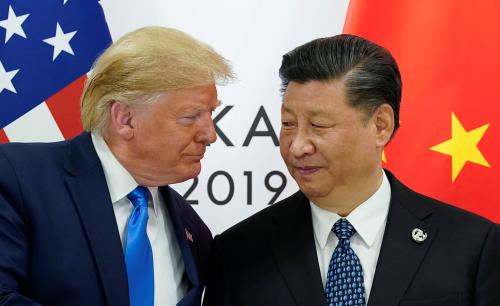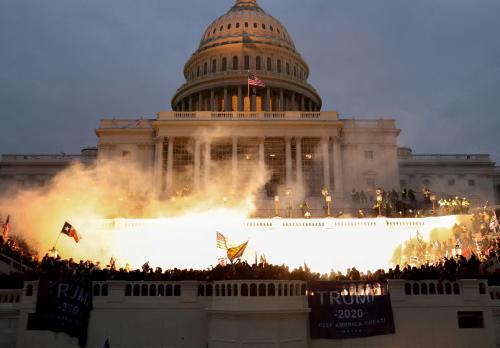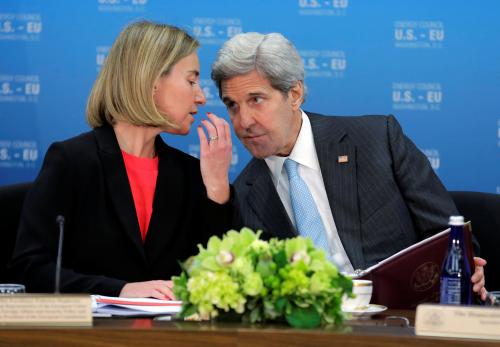In the fall of 1989, Czechoslovak citizens took to the streets of Prague to peacefully protest the repressive Communist regime that had maintained a stranglehold on the country for over forty years. Within months, this “Velvet Revolution” caused the regime to collapse, democracy to take root, and a leading dissident who had been in prison a year prior, Václav Havel, to be elected and sworn in as president of the new Czechoslovak Republic. The pro-democracy Czechoslovaks were assisted in this effort by the U.S. embassy in Prague, whose staff persistently advocated for human rights using all available diplomatic channels.
Our new book—Democracy’s Defenders: U.S. Embassy Prague, the Fall of Communism in Czechoslovakia, and Its Aftermath—analyzes the supportive role that the United States played in Czechoslovakia’s Velvet Revolution and the peaceful democratic and economic transitions that followed. The best practices of U.S. diplomacy made a peaceful and successful transition possible and at times exemplified the highest ideals of the American experiment.
Unfortunately, those practices are today absent from the Trump administration’s COVID-19 response. Here, we set forth three key lessons gleaned from the successes and failures of American diplomatic history, as exemplified by 1989. They offer a sobering framework to understand the full extent of the betrayal of America’s traditional global leadership role by the Trump administration.
1. Support international organizations. In 1975, the Czechoslovak government signed the Helsinki Accords, an international agreement in which the regime formally (albeit reluctantly) committed to respecting human rights in exchange for other concessions from the West. This commitment opened the door not only for increased dissent among Czechoslovak citizens, but for a new form of leverage by the United States. The Human Dimension Mechanism of the Helsinki Accords established a channel for countries to raise concerns about human rights abuses in other participating states, and the U.S. Congress established a Helsinki Commission to monitor compliance.
While the Communist regime continued to harass dissidents for over a decade after the accords were signed, it could not flagrantly repress dissent without repercussions from the international community. As we discuss in the book, the international pressure of this human rights strategy supported the development of the vibrant dissident community that drove the Velvet Revolution. It likely contributed to the events of 1989 in other ways as well, including helping to ensure that the Communist regime surrendered power without firing a single shot.
By contrast, the Trump administration’s notorious go-it-alone style has typified its response to the COVID-19 crisis, as reflected in its ongoing assault on the World Health Organization (WHO). In a seeming attempt to deflect from his own widely panned handling of the pandemic—which has led to the deaths of over 125,000 Americans to date—Trump turned the international health body into a boogeyman. Claiming, without evidence, that the WHO helped China cover up the coronavirus outbreak and was therefore responsible for its spread around the world, Trump first froze U.S. funding to the organization, then announced that the United States would leave the organization entirely.
While his legal ability to withdraw the U.S. from the WHO is unclear, the message that such a move sends is not: that Trump’s longstanding disdain for alliances, partnerships, and international organizations knows no bounds, including those of a deadly virus. The harms of this approach range from the immediate (the attendant public health consequences of defunding an international health organization in the midst of a pandemic) to the longer term (including a collapse in global trust in the United States to lead the world in the right direction). By pulling out of the WHO rather than leading it from within, the United States weakens its owns security—and, perversely, strengthens China’s influence within the public health community.
2. Exercise moral leadership. When the new American ambassador to Czechoslovakia, Shirley Temple Black, arrived in Prague in August 1989, she met with the East German ambassador, Helmut Ziebart, whom she termed the “dean of the Prague diplomatic corps.” After peppering him with questions about protocol and politics alike, Ziebert offered one piece of unsolicited advice: “Do not ask the Czech officials any tough questions.” Fortunately, Black ignored him. In her first meeting with Czechoslovak Foreign Minister Jaromir Johanes less than a week later, she emphasized the importance of freedom of the press—sticking up for the Western news outlets Radio Free Europe and Voice of America, which were regular targets of Communist attacks—as well as freedom of assembly and religion. Black continued to tirelessly advocate for these hallmarks of a democratic society in the months that followed.
That clear vision of robust American leadership, guided by democratic principles and exemplified by its diplomats, has been sorely lacking in the Trump administration’s response to COVID-19. Indeed, throughout the crisis, the United States government has not only failed to stand up for its founding principles, it has actively worked to turn the international community against them. At a March meeting of the Group of 7 (G-7), an organization consisting of seven countries with advanced economies, the Trump administration insisted on referring to the coronavirus outbreak as the “Wuhan virus,” a term that has fanned the flames of xenophobia against Asian people and those of Asian heritage around the world. The insistence of Secretary of State Mike Pompeo that the term “Wuhan virus” be included in any joint statement issued by the countries was rejected by all other G-7 members. As a result, the group failed to issue a joint communique—as is customary—but instead issued separate statements.
The administration’s adamance about using such a racially charged term is part and parcel of its incessant attempts to both deflect criticism of its own pandemic strategy and to prioritize domestic political posturing above much-needed international cooperation. By referring to the “Wuhan virus” and the “Chinese virus,” Trump—as he did with the WHO—seeks to blame China for the spread of the virus and in doing so vindicate the United States’ own poor coronavirus response. Such scapegoating, as best exemplified in Trump’s candid statement that “I take no responsibility at all” for failures in the U.S. coronavirus testing apparatus, is not just a far cry from Black’s moral clarity: it represents the precise opposite.
3. Work across the aisle. The notion that “politics stops at the water’s edge” has never been fully accurate, but it is undeniable that the foreign policy goals of the Democratic and Republican parties at the end of the Cold War were far more aligned than in the present day. The fall of 1989 saw the arrival in Prague of a bipartisan congressional delegation, whose members—Democratic and Republican alike—questioned Foreign Minister Johanes on the regime’s recent crackdown on a protest, suppression of a dissident petition that circulated in Czechoslovakia throughout 1989, and other tough issues. After the regime fell, the Republican Bush administration assisted with Czechoslovakia’s economic and political transitions—work that would continue and deepen under the Democratic Clinton administration.
In recent months, the bipartisan domestic response to the international COVID-19 crisis started auspiciously enough. Democrats and Republicans in Congress quickly passed several bills, including an unprecedented $2.2 trillion domestic stimulus and relief bill and $8.3 billion for COVID-19 responses domestically and internationally. The State Department and USAID further dedicated $900 million for COVID-19-related international assistance. However, these brief moments of bipartisan cooperation were rapidly undermined by Trump’s relentless efforts to paint Democratic states and cities as “poorly run” and so undeserving of aid, his raging against such Democratic politicians as Michigan governor Gretchen Whitmer and Washington governor Jay Inslee, and his promotion of a conspiracy theory implicating former president Barack Obama—to name just a few. The lack of bipartisan solidarity in facing the domestic and international threat of the virus weakens our ability to address it. If the United States cannot unify at home, we cannot be effective or respected abroad.
American foreign policy in the years leading up to, during, and after 1989 contributed to the peaceful fall of a repressive Communist state in Czechoslovakia and the transition to democracy there and elsewhere in the former Soviet bloc. The Trump administration has lost sight of the benefits that a foreign policy melding ideals with interests can offer, at great cost to both leadership and lives. By studying the lessons of history, we can see the full extent of that blindness—and look forward to a day when the United States government returns to its proud tradition of global leadership as the world continues its fight against COVID-19.








Commentary
Democracy’s defenders no more: Trump’s failure to learn from history in the global COVID-19 fight
July 2, 2020